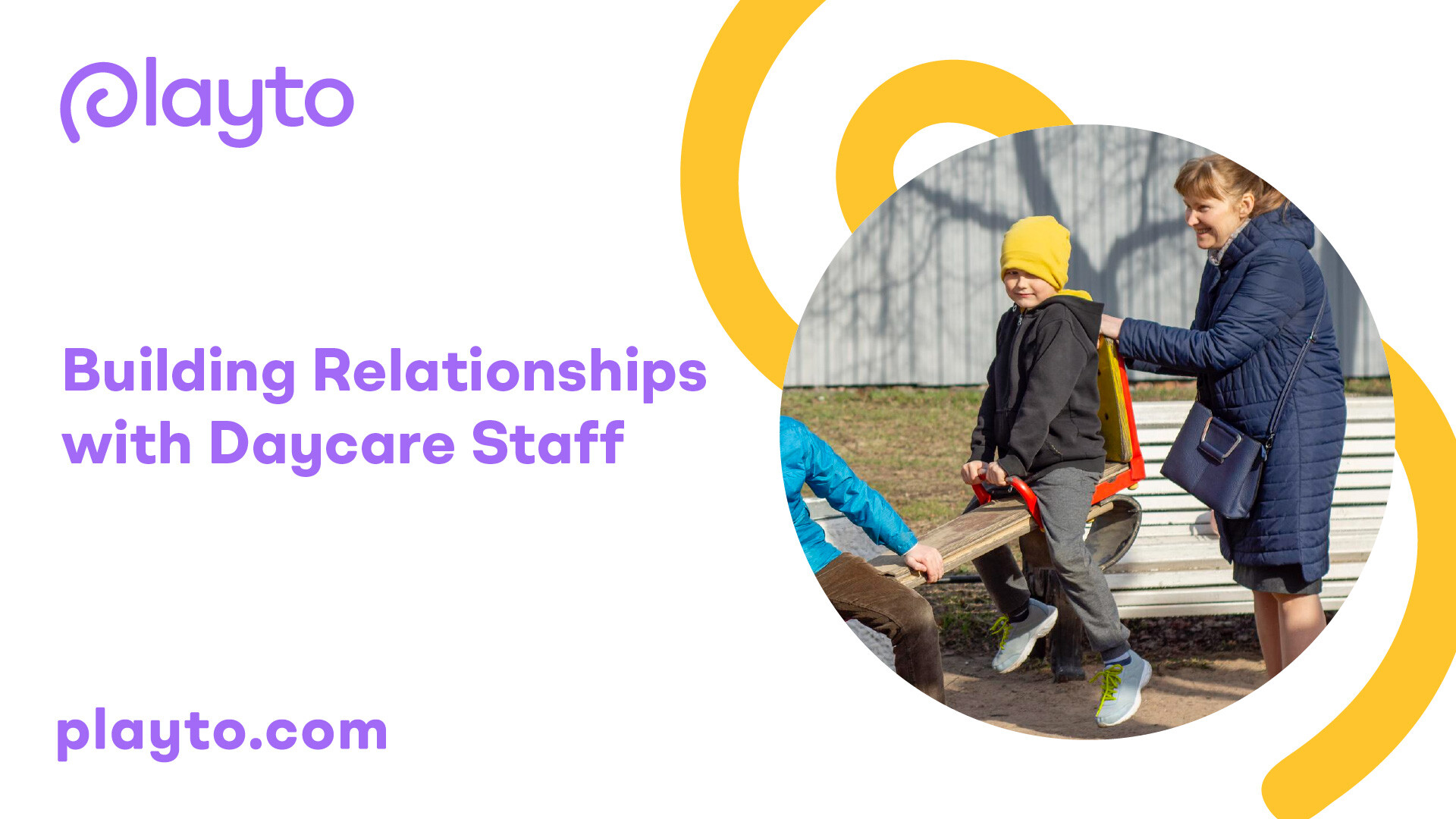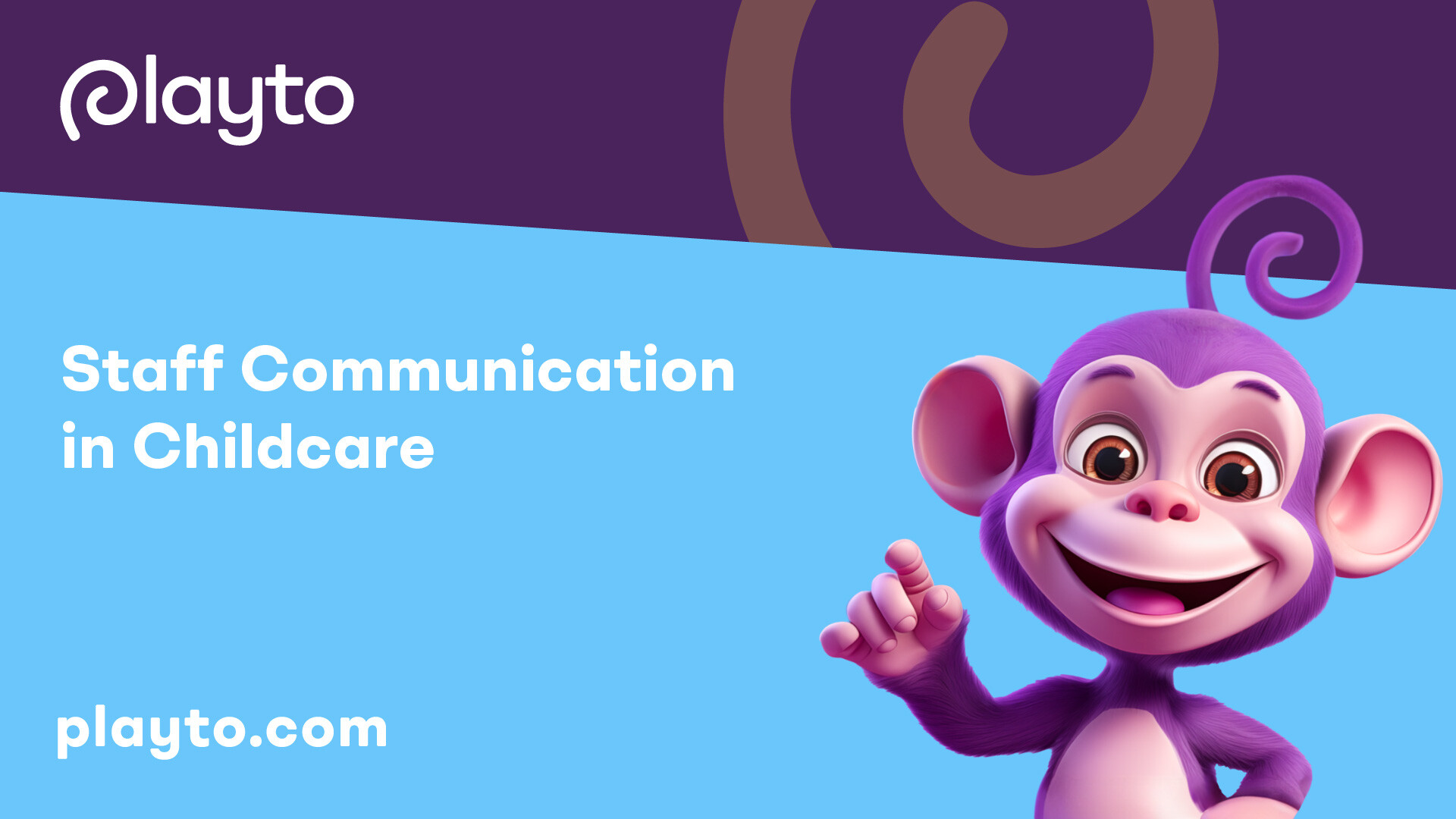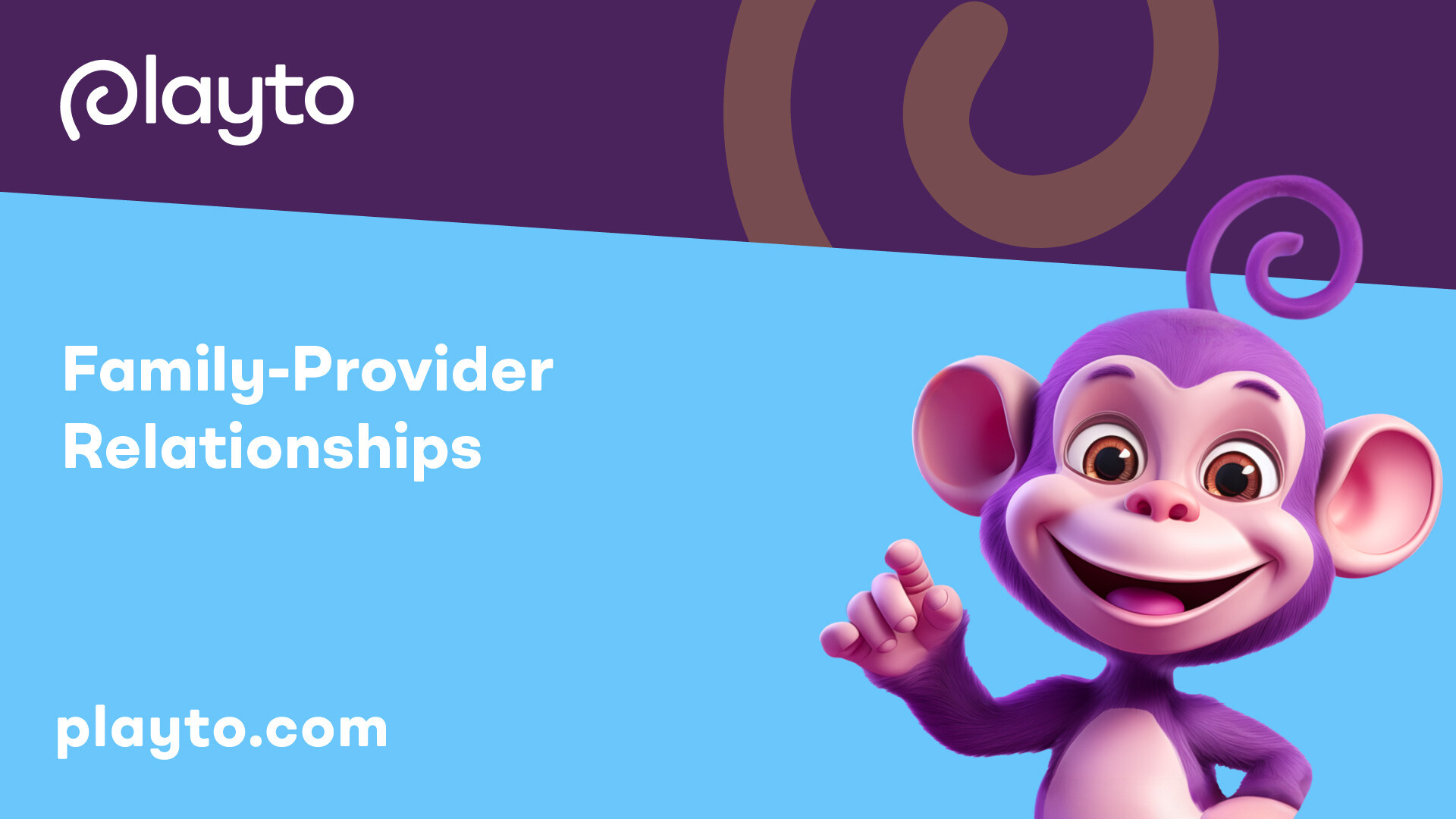Building Relationships with Daycare Staff
Establishing strong relationships with daycare staff is essential for creating a positive and supportive environment for your child. By showing appreciation and gratitude, as well as employing effective communication strategies, parents can foster strong connections with the daycare staff.

Showing Appreciation and Gratitude
Expressing gratitude towards daycare staff can go a long way in building positive relationships. Simple gestures like a heartfelt thank you, a card, or a small gift can show your appreciation for their hard work and dedication [1]. Taking the time to acknowledge their efforts and recognize their contributions can help strengthen the bond between parents and daycare staff.
Effective Communication Strategies
Effective communication is key to building relationships with daycare staff. By actively engaging in conversations and showing interest in their work, parents can create an open and collaborative environment. It is important to be respectful and considerate when communicating with daycare staff, as they play a vital role in your child's development.
To establish effective communication, consider the following strategies:
- Establish Open Channels: Childcare providers should create open channels of communication where both parents and staff can initiate conversations and share information. This two-way communication ensures that everyone is involved and well-informed about the child's progress and well-being.
- Understand Individual Goals: Childcare providers should make an effort to understand each child's individual goals, objectives, and priorities for their development. By aligning goals with parents, providers can work together to support the child's growth and provide consistent care.
- Active Parental Participation: Actively participate in daycare activities and events. Attend parent-teacher conferences, volunteer when possible, and engage in conversations about your child's experiences and progress. This involvement helps build rapport with daycare staff and demonstrates your commitment to your child's well-being.
By implementing these strategies, parents can create a positive and collaborative relationship with daycare staff. Remember, open and respectful communication is key to building strong partnerships that benefit your child's overall development.
In the next section, we will explore the importance of trust, respect, and active parental participation in family-provider relationships.
Staff Communication in Childcare
In the realm of childcare, open and effective communication among staff members is of utmost importance. The ability to communicate openly and transparently contributes to the overall success of a daycare center. It enhances child development, ensures consistency in care, facilitates conflict resolution, promotes collaborative problem-solving, boosts staff morale and retention, fosters parental trust and confidence, ensures compliance with regulations, supports professional development, aids in crisis management, and helps build a strong community within the childcare center.

Importance of Open Communication
Open communication in childcare centers is vital for various reasons. It creates an environment where staff members feel comfortable sharing ideas, concerns, and feedback. It encourages active listening and empathy, fostering a supportive and collaborative workplace culture. Open communication also helps create a sense of trust and transparency among staff members, which in turn builds stronger relationships and teamwork. With open lines of communication, staff members can more effectively address issues, resolve conflicts, and work together to provide the best care for the children.
Best Practices for Staff Communication
To ensure effective communication among staff members in childcare centers, it is important to establish and follow best practices. These practices promote clear and efficient communication, leading to improved collaboration and overall center performance. Some key best practices include:
- Establish Open Lines of Communication: Encourage staff members to share ideas, concerns, and feedback openly. Create an environment where everyone feels comfortable expressing themselves.
- Set Clear Expectations: Clearly define expectations for communication within the center. Establish guidelines and protocols for communication channels, response times, and professional conduct.
- Utilize Multiple Communication Channels: Implement various communication channels, such as in-person meetings, email, messaging apps, and bulletin boards. This ensures that information reaches all staff members effectively.
- Implement Regular Staff Training on Communication Techniques: Provide training sessions on effective communication skills, active listening, conflict resolution, and teamwork. This helps staff members develop and enhance their communication abilities.
- Develop a Strong Internal Communication System: Establish a system for internal communication that ensures important information is shared promptly and accurately among staff members. This may include regular staff meetings, newsletters, or digital platforms.
- Use Visual Aids: Visual aids, such as charts, diagrams, and bulletin boards, can enhance communication by providing clear visual representations of schedules, procedures, and important information.
- Foster a Collaborative Environment: Encourage collaboration and teamwork among staff members. Foster a culture where ideas are valued, and everyone feels empowered to contribute to the center's success.
- Create a Feedback System: Establish a feedback system that encourages staff members to provide constructive feedback and suggestions for improvement. Regularly review and address feedback to promote continuous growth and improvement.
- Review and Update Communication Strategies: Regularly assess the effectiveness of communication strategies and make necessary adjustments. Stay up to date with new technologies and tools that can enhance communication within the center.
- Celebrate Successes and Milestones: Recognize and celebrate achievements, milestones, and positive contributions within the childcare community. This fosters a sense of camaraderie and motivation among staff members.
By implementing these best practices, childcare centers can create an environment where staff members feel valued, respected, and empowered. Effective staff communication ensures that everyone is working together cohesively to provide the best possible care and support for the children and their families.
Family-Provider Relationships
Establishing strong relationships between families and daycare staff is of utmost importance in creating a positive environment for young children. These relationships are built on trust, respect, and active parental participation.

Importance of Trust and Respect
Trust and respect form the foundation of effective family-provider relationships in daycare settings. When parents trust the daycare staff to provide quality care and nurture their child's development, it fosters a sense of security and peace of mind. Similarly, daycare staff should respect the unique values, beliefs, and cultural backgrounds of each family, creating an inclusive and welcoming environment.
By cultivating trust and respect, parents feel confident in communicating their concerns, sharing important information, and actively participating in their child's daycare experience. This collaborative approach helps to establish a strong partnership between families and daycare staff, benefiting the child's overall well-being and development.
Active Parental Participation
Active parental participation is vital in building relationships with daycare staff and ensuring the child's needs are met. Parents should actively engage with the daycare program by volunteering, attending meetings, visiting the facility, assisting in the classroom, or serving on committees. This level of involvement not only strengthens the bond between the child and caregiver but also demonstrates a commitment to their child's education and well-being.
Regular communication is a key aspect of active parental participation. Parents should engage in open and honest conversations with daycare staff about various aspects of their child's day, such as eating habits, behavior, activities, and learning of new skills. This exchange of information helps to create a well-rounded understanding of the child's experiences and enables parents and staff to work together in supporting the child's growth and development.
To support effective communication, daycare staff should be attentive and open to negotiation when parents bring concerns or complaints. They should actively listen, provide clear and timely feedback, and address any issues that may arise. By practicing assertive communication, daycare staff can ensure that parents feel heard and valued, strengthening the family-provider relationship.
By prioritizing trust, respect, and active parental participation, daycare programs can create a nurturing and supportive environment for children. This collaborative approach leads to positive outcomes for both the child and the family, fostering a sense of belonging and promoting optimal development. For more information on daycare relationships, see our article on daycare staff qualifications and training.
Relationship-Based Childcare
Relationship-based childcare is an approach that emphasizes the importance of building strong and nurturing relationships between children, parents, and daycare staff. This approach recognizes the significance of consistent and stable caregiving in supporting children's social-emotional development and overall well-being.
Primary Caregiving Approach
One key component of relationship-based childcare is the primary caregiving approach. In this approach, a single adult in the daycare setting takes on the responsibility of caring for a small group of children. This allows for the development of a stable and trusting relationship between the caregiver, child, and family.
By having a primary caregiver, children can form secure attachments and establish a sense of trust and familiarity. This approach contrasts with a large classroom setting where children may interact with multiple caregivers throughout the day. The primary caregiving approach ensures that children have consistent and nurturing relationships, which are essential for their emotional and social development.
For more information on related topics, you can refer to our articles on daycare discipline policies: what to expect, daycare field trips: safety and educational value, daycare staff qualifications and training and daycare policies on field trip permissions.
Continuity of Care Principle
Continuity of care is another fundamental principle of relationship-based childcare. This principle emphasizes the importance of maintaining a child's bond with their primary caregiver over a sustained period of time. Rather than changing caregivers as children grow older, continuity of care promotes the idea of working with the same caregiver through various age stages.
This principle aligns with attachment theory, which suggests that strong and secure attachments formed in early childhood have a long-lasting impact on a child's behavior and relationships in adulthood. Attachment theory emphasizes the significance of providing children with opportunities for attachment and high-quality caregiving, as these factors contribute to the development of trust and secure relationships.
By prioritizing continuity of care, relationship-based childcare supports the formation of meaningful and long-lasting relationships between children and their primary caregivers. This approach recognizes the importance of consistency and stability in a child's early years, setting the foundation for healthy social and emotional development.
To further enhance the relationship-based childcare experience, active parental participation is vital. When parents are involved in their child's daycare experience, it promotes continuity of care and allows for the exchange of valuable information between parents and staff. This collaboration ensures that the child's routines, preferences, and needs are well understood, leading to personalized care and consistency between home and school.
By implementing relationship-based childcare practices, daycare centers can create an environment where children feel secure, cared for, and valued. These practices foster meaningful relationships and contribute to the overall well-being and development of young children.
Addressing Concerns with Daycare Staff
When it comes to addressing concerns with daycare staff, it is essential to approach the situation with courteous communication and a focus on balancing concerns and relationships.
Courteous Communication
One of the key aspects of addressing concerns with daycare staff is maintaining a courteous and respectful demeanor. It is important to remember that the staff members are responsible for the care and well-being of your child, so maintaining a positive and constructive approach is crucial.
When discussing concerns, it is helpful to focus on the future and clearly state your expectations for the behavior or situation in question. Be specific about the issue and provide any relevant details that can help the staff understand your perspective. It is important to communicate problems and suggest solutions in a way that does not damage the self-confidence and dignity of the staff.
Balancing Concerns and Relationships
Addressing concerns with daycare staff can be challenging, as they are the individuals responsible for your child during the day. It is crucial to find a balance between addressing concerns and maintaining a positive relationship with the staff for the well-being of your child.
When discussing concerns, it is important to consider the personalities of the individuals involved, the local culture, and the staff's receptiveness to constructive criticism. Be mindful of your tone and language, ensuring that your communication is respectful and non-confrontational. It may be helpful to approach the conversation as a collaborative effort, working together with the staff to find solutions that benefit everyone involved.
However, if the daycare staff do not respond with respect for your position and willingness to address concerns, it may be a sign that finding a new daycare provider is necessary for the well-being of your child [6].
Remember that open and effective communication is key when addressing concerns with daycare staff. By maintaining courteous communication and finding a balance between concerns and relationships, you can work towards a resolution that ensures the best possible care for your child.
Parental Involvement in Childcare
Active parental involvement in daycare settings has a significant impact on a child's development. When parents actively engage with their child's daycare experience, it influences positive behavior, cognitive achievement, and emotional growth, ultimately preparing them for further studies. In this section, we will explore the impact of parental involvement on child development and discuss how it enhances teacher-parent relationships.
Impact on Child Development
Parental involvement in early childhood education plays a crucial role in children's overall development. When parents actively participate in their child's daycare experience, it creates a sense of continuity between home and daycare, reinforcing learning and behavioral expectations. This alignment helps children feel secure and supported, leading to positive outcomes in their social, emotional, and academic development.
Research has shown that children with involved parents tend to exhibit better school readiness skills, higher academic achievement, and improved behavior. They are more likely to have positive relationships with peers and teachers, fostering a sense of belonging and confidence [7]. By actively engaging in their child's daycare education, parents can create an environment that nurtures their child's growth and sets them up for success.
Enhancing Teacher-Parent Relationships
Building strong relationships between parents and daycare staff is essential for the overall well-being and development of the child. When parents and teachers have open lines of communication and a positive rapport, it allows for effective collaboration in supporting the child's growth and learning [8].
Teachers who have a strong relationship with parents gain valuable insights into the child's life at home, enabling them to tailor classroom learning to the child's individual needs. This personalized approach helps address any challenges the child may face and fosters a more supportive and inclusive learning environment.
For parents, having a good relationship with teachers and daycare staff allows them to be actively involved in their child's education. They can contribute their knowledge about their child's interests, strengths, and areas for growth, helping the teachers provide a well-rounded education that aligns with the child's individual needs.
By fostering strong teacher-parent relationships, parents and daycare staff can work together as a team to support the child's development, creating a collaborative and nurturing environment that benefits the child and strengthens the overall community.
In conclusion, parental involvement in daycare settings has a profound impact on a child's development. By actively participating in their child's daycare experience, parents can positively influence their child's behavior, academic achievement, and emotional growth. Furthermore, building strong relationships with daycare staff enhances communication and collaboration, creating an environment that supports the child's overall well-being and success.
